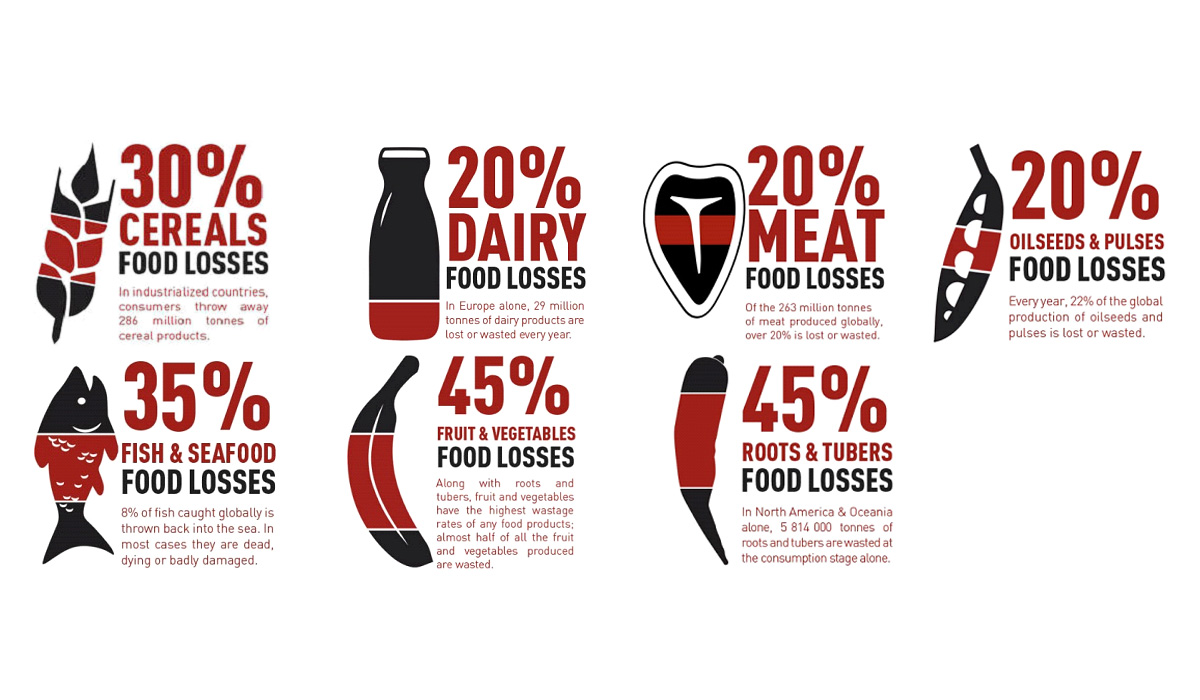
Food waste, a matter that concerns us all
Food waste is a global issue and all of us – producers; food processors and retailers; governments and individual consumers – can make changes at every step in the food chain to prevent food waste from happening.
The impact of food loss is best expressed in numbers: More than one-third of all food is spoiled or damaged before it reaches supermarket shelves. That is approximately 1.3 billion tonnes worldwide.
Data from the UN Food and Agriculture Organization (FAO) has found that 40 per cent of food loss takes place at the post-harvest and processing stages of the food supply chain in developing countries due to inadequate infrastructure and technology.
In industrialised countries, more than 40 per cent of food is wasted at the retail and consumer level due to over stocking, over preparation or simply being kept until it is no longer fit to eat.

There are numerous projects around the globe working to tackle this issue. All of them propose and encourage a variety of activities to help reduce food waste across the supply chain.
Below are some ideas and solutions that will contribute towards food waste reduction in each step in the food chain:
At farm level:
- Communication and cooperation among farmers to cover surplus and shortages from each another.
- Organizing small resource-poor farms in groups to upscale production and marketing, accessing credit from agricultural financial institutions. This solution will prevent small cash trapped growers to harvest prematurely with consequent loss in nutritional and economic value.
- Reduce transport miles by creating market options closer to the production base.
- Develop market for sub-standard products.
- Gleaning unharvested produce and preserving with various methods such as pickling, IQF and drying.
- Develop knowledge and capabilities of food chain operators to apply safe food handling practices to avoid wasting food due to not being safe for human consumption.

At production and retail level:
- Make purchasing decisions based not only on historic sales information but also considering historical surplus food data and inventory logs.
- For foodservice and food manufacturing: substitute retail-grade product for off-spec produce and pre-trimmed meat.
- Inventory management and production planning: Use software that links demand forecasting with menu plans and recipe ingredients to help automate production planning and ordering processes.
- Improve communication between the different parts of the supply chain to better balance the demand and offer. Make the most of latest Apps matching surplus stock with demand.
- Dynamic pricing and markdowns to match stock with demand.
- Standardized date labelling, removing or reducing visibility of “Display/ Sell by’ dates.
- Educate consumers to change the perception of miss-shaped produce.
- Flexible range and stock fill in stores to mirror fluctuating demand.
- Use of packaging and packing methods that prolong shelf life.
- Determine the business case for food donation.
- When donation is not feasible, consider animal feed.
- Use of centralized composting or anaerobic digestion.
- Use of onsite composting.
- Recycle cooking oil for biofuel production.

For end consumers:
- Purchasing the right amount: plan your meals and make a detailed shopping list of your requirement.
- Buying online reduces the amount of impulse and unnecessary purchases.
- Treat expiration dates as guidelines and find alternative solutions to passed-date produce: use fruit that has gone soft in smoothies or juices and wilting vegetables in soups or stews.
- Practice FIFO (first in, first out).
- Plan meals around the stock you already have at home.
- Save, freeze and eat leftovers.
- Designate one dinner each week as a “use-it-up” meal instead of cooking a new meal.
- Find alternative usages for seeds and peels, there are plenty of recipes online and cook books.
- Store food properly in the fridge and freezer. How and where we store food will make a difference in how long it will last.
Many food organizations and governments are already adopting practices to reduce food waste. However, the solution to food waste also resides in all of us as consumers: raising awareness of this escalating problem and demanding governments to create an environment that encourages food waste reduction, changing our purchasing behaviour towards perfect-looking food and adopting practices that maximises food usage.
The global food waste does not have just an ethical and environmental implication, it also has an economic one. The cost of this food waste is either hidden in the final price which us consumers end up paying for, or it results in a profit loss along the food chain, in many cases affecting those most in need. Whatever the motivation, isn’t it worth all of us doing our part?
By Luciana VeccoKeep in Touch
Read more about what we do and how we can help your business achieve its full potential
Drop us a line